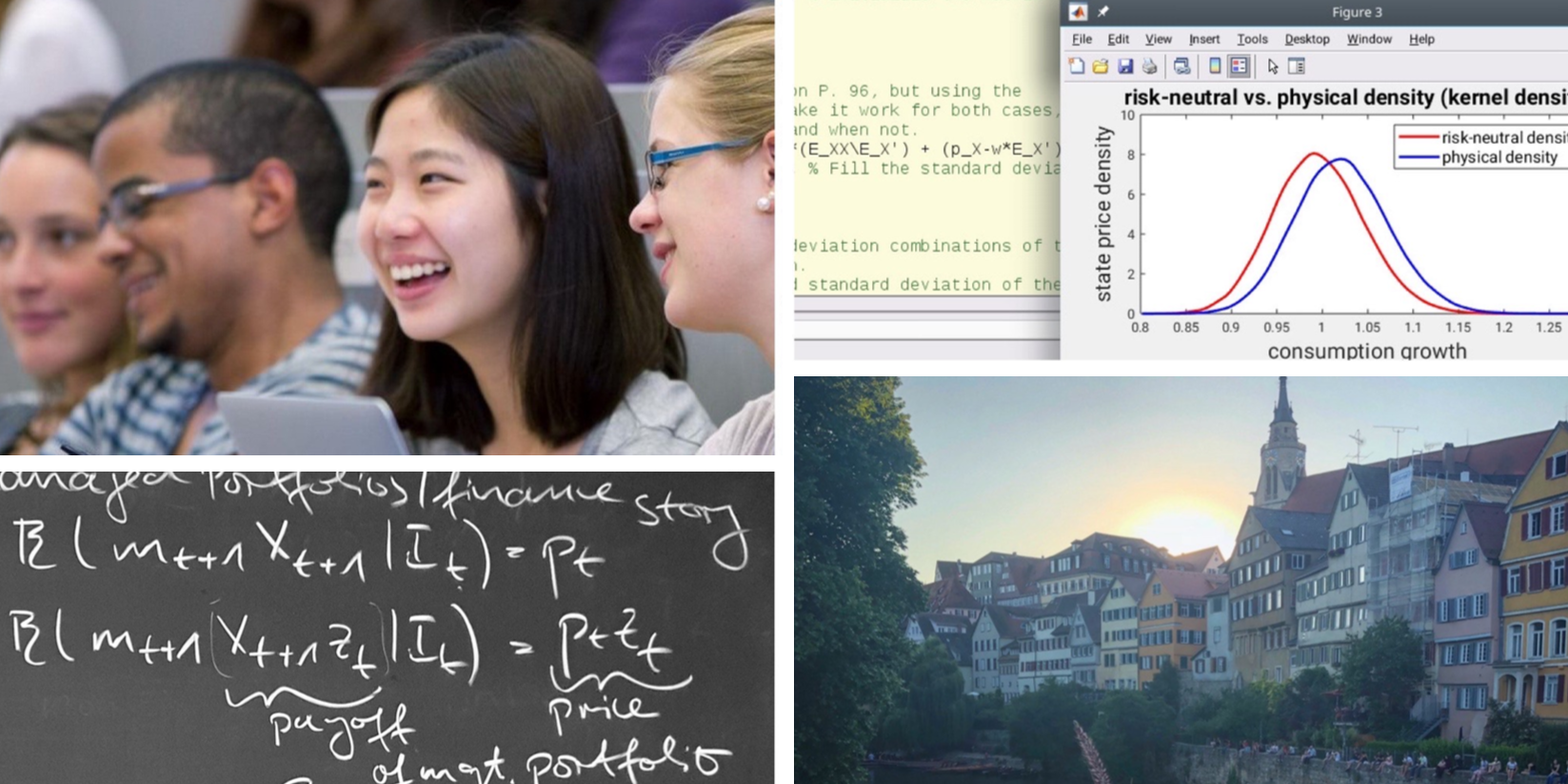Economics and Finance - Master
Eckdaten zum Studiengang
Fakultät
Wirtschafts- und Sozialwissenschaftliche Fakultät
Abschluss
Master
Zulassungsbeschränkung
Ja, im 1. und höheren Fachsemestern
Regelstudienzeit
4 Semester
Kombinationsfach erforderlich?
Nein
Bewerbungsfrist
für
Deutsche, EU-Bürger/innen und Bildungsinländer/innen
Wintersemester:
15.05
Bewerbungsfrist
für
Nicht-EU-Bürger/innen
Wintersemester:
15.05
Gilt für alle Bewerber/innen mit deutscher oder EU-Hochschulzugangsberechtigung.
Studienbeginn
Wintersemester
Unterrichtssprache
Englisch
Finanzen
Beiträge und Gebühren
Voraussetzung und Bewerbung
Admission is subject to a competitive selection procedure that includes individual interviews with faculty members. Shortlisted candidates will be interviewed in a video conference.
Application deadline: May 15.
Interviews with shortlisted applicants are scheduled for mid-June.
Letters of admission will be sent out by late June - early July.
Our programs start at the beginning of October.
Find more information on the admission process on our website.
We publish all news concerning the application process on our website so you can stay in the loop.
Admission to the M.Sc. in Economics and Finance program requires a Bachelor’s degree in economics, business studies or a related field with excellent grades. Applicants are expected to have sound intermediate level knowledge of microeconomics, macroeconomics, finance and quantitative methods (mathematics / statistics / econometrics).
For more information check the webpage of our School.
The program is free of tuition fees for all EU residents. The state of Baden-Württemberg has introduced fees for international non-EU students and second-degree students. For background information and for fee exemption options, please refer to this link.
The entire program is taught in English. Applicants should therefore be fluent in English. Knowledge of German is not required to complete this program. However, German classes are available for international students.
Details zum Studiengang
The 2008 crisis originating in the financial sector had severe consequences for economies and societies worldwide. It is therefore of the utmost importance that decision makers in financial institutions, regulatory offices, and central banks have a sound understanding of economic theory, the financial instruments designed for risk management, and the tools of modern econometric analysis. Consequently, the M.Sc. in Economics and Finance combines the strenghts of our school in economics, finance and econometrics to endow our graduates with the skills needed to address these issues.
Graduating from our program, you will be able to analyze financial and economic data in a scientific manner. You will know how prices of risky assets should be determined and understand why financial instruments like options and futures can increase social welfare, even though they may involve potential risks for individual investors and financial stability.
Throughout the program, you will acquire methodological skills (theoretical, econometric and programming) and expertise that greatly enhance your career perspectives. A M.Sc. in Economics and Finance is the first step towards an ambitious professional career in private and public (financial) institutions or academia.
Specializations
- Quantitative Monetary Economics and Finance
- Econometrics, Statistics and Machine Learning
- Empirical and Theoretical Finance
Freiwilliger Auslandsaufenthalt
In jedem Studiengang ist ein freiwilliger Auslandsaufenthalt möglich. Mit der Planung sollte ca. ein bis eineinhalb Jahre vor der Abreise begonnen werden.
Weitere Informationen und Beratung zum Auslandsstudium finden Sie auf der fachübergreifenden Seite Wege ins Ausland. Zudem bieten einige Fächer auch eigene Informationen zu Auslandsaufenthalten an.
The Module Handbook describes the goals and structure of a degree program. In the module handbook, you will find details of the type of modules offered and their respective workloads as well as te classes, requirements and assessment. An ideal course plan is set out in the module handbook to help you plan your studies. The module handbook and the exam regulations help you to understand the framework and conditions of your program, and enable you to choose the right modules/ classes.
The exam regulations contain the legally binding regulations for a degree program. They set out, for instance, which modules must be taken and which assessment must be completed in order to successfully complete the degree program. The exam regulations also regulate how often exams may be repeated, which deadlines apply to assessment, and how the final grade is calculated. The exam regulations and the module handbook help you to understand the framework and conditions of your program, and enable you to choose the right modules/ classes.
Entscheidungshilfe bei der Studienwahl
Entscheidungshilfen für ein Erststudium
Die Universität bietet Hilfen zur Entscheidungsfindung an. Dazu gehören z.B. der Besuch von Lehrveranstaltungen, Orientierungsveranstaltungen zu Studienwahlthemen sowie verschiedene Beratungsangebote. Weitere Hinweise finden Sie auf den Seiten für Studieninteressierte.
Entscheidungshilfen für Masterstudiengänge
Bei der Studienwahlentscheidung für die Masterstudiengänge spielen Spezialisierung, Schwerpunktsetzung und forschungs- sowie berufsbezogene Kriterien eine Rolle. Für Interessierte an Masterstudiengängen gibt es eine Vielzahl an Orientierungshilfen wie z.B. den Besuch von Lehrveranstaltungen und spezielle Beratungs- sowie Informationsangebote (z.B. Zentrale Studienberatung, Studienfachberatung, Career Service). Nähere Informationen finden Sie unter Beratung und Information.

Enrolling in the program was one of the best decisions I've ever made. It enriched my knowledge, expanded my horzion and helped me discover my potential.
Wenting Xing, B.Sc. Tianjin University
Nach dem Studium
We offer a Master's degree that enjoys a high international reputation and gives you a competitive edge on the job market. You will acquire cutting-edge scientific knowledge that is in high demand for a broad range of professional careers. Graduates may aim for a subsequent doctoral degree (Ph.D.) or executive careers in business and finance as well as administrative positions in the public sector and international institutions. Moreover, career paths in economics and finance also include policy advising, publishing, consulting and research.
Beratung und Praktika
Der Career Service der Universität berät bei der Berufsorientierung und beim Berufseinstieg. Praktika und Jobs finden Sie im Praxisportal.
You may complete the M.Sc. in Economics and Finance program on a Ph.D. track. This effectively puts you on a fast track to a doctoral degree, according to our doctoral programs in Economics, Finance and Business Studies.
The Ph.D. track requires 27 ECTS credits from courses explicitly marked as Ph.D.-oriented. These courses take students to the frontier of academic research.
See also the school's Graduate Program of the School of Economics

